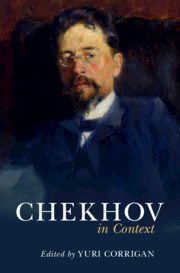Book contents
- Chekhov in Context
- Chekhov in Context
- Copyright page
- Contents
- Figures
- Contributors
- Foreword
- Note on Texts, Dates, and Transliteration
- Chronology
- Introduction
- Part I Life
- Part II Society
- Part III Culture
- Part IV Literature
- Chapter 21 Print Culture
- Chapter 22 Embarrassment
- Chapter 23 Tolstoy
- Chapter 24 French Literature
- Chapter 25 Modernism and Symbolism
- Chapter 26 Theatrical Traditions
- Chapter 27 Modern Theater
- Chapter 28 Chekhov’s Moscow Art Theater (1897–1904)
- Part V Afterlives
- Notes
- Further Reading
- Index
Chapter 24 - French Literature
from Part IV - Literature
Published online by Cambridge University Press: 16 February 2023
- Chekhov in Context
- Chekhov in Context
- Copyright page
- Contents
- Figures
- Contributors
- Foreword
- Note on Texts, Dates, and Transliteration
- Chronology
- Introduction
- Part I Life
- Part II Society
- Part III Culture
- Part IV Literature
- Chapter 21 Print Culture
- Chapter 22 Embarrassment
- Chapter 23 Tolstoy
- Chapter 24 French Literature
- Chapter 25 Modernism and Symbolism
- Chapter 26 Theatrical Traditions
- Chapter 27 Modern Theater
- Chapter 28 Chekhov’s Moscow Art Theater (1897–1904)
- Part V Afterlives
- Notes
- Further Reading
- Index
Summary
Sergei Kibalnik explores how Chekhov conducted polemics with major French writers of the nineteenth century and how he overcame his status as the “Russian Maupassant,” ultimately rejecting the latter’s absurd view of life in favor of a more homegrown redemptive moral strategy grounded in the possibility of inward transformation.
- Type
- Chapter
- Information
- Chekhov in Context , pp. 184 - 190Publisher: Cambridge University PressPrint publication year: 2023

